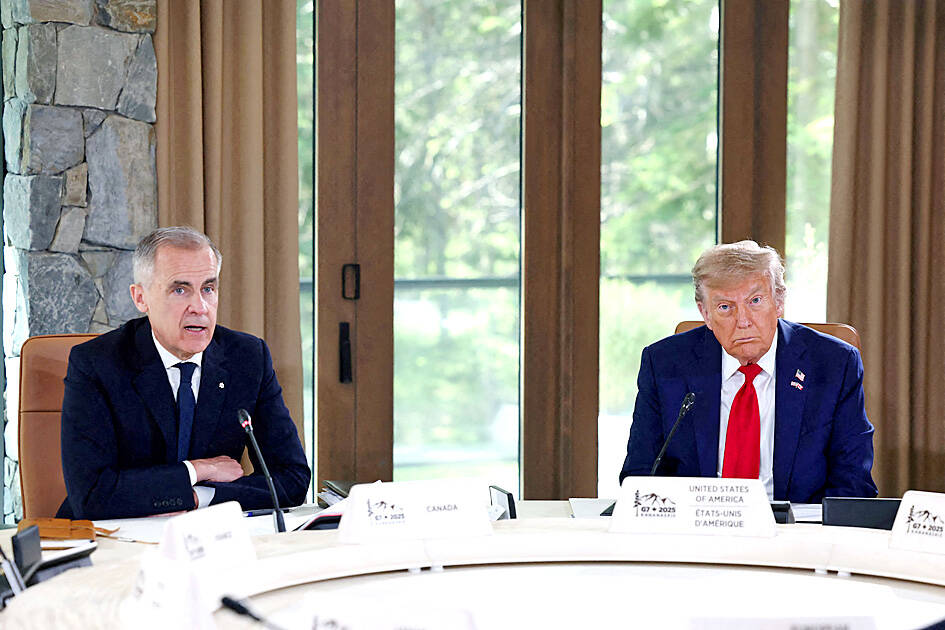Canada has withdrawn its digital services tax (DST) on technology companies such as Meta Platforms Inc and Alphabet Inc in a move to restart trade talks with the US.
“Rescinding the DST will allow the negotiations to make vital progress and reinforce our work to create jobs and build prosperity for all Canadians,” Canadian Minister of Finance Francois-Philippe Champagne wrote on social media late on Sunday.
On Friday afternoon, US President Donald Trump said he was ending all trade discussions with Canada, one of its largest trading partners, in retaliation for the digital tax. He also threatened to impose a fresh tariff rate within a week.

Photo: Reuters
Instead, Trump and Canadian Prime Minister Mark Carney agreed the countries would restart negotiations and try to agree on a deal by July 21. The Canadian dollar strengthened on the news.
For Canada, the economic stakes of those discussions are huge. About three-quarters of its exports go to the US, including the vast majority of its oil and many other commodities, as well as most of the cars and trucks it produces.
However, the US also has something on the line: Canada is the largest buyer of US products. Last year, the US exported about US$440 billion of goods and services to its northern neighbor and imported US$477 billion from it, US government data showed.
The first payment for Canada’s digital tax was supposed to be due yesterday.
The tax, which was passed into law last year by the previous government of former Canadian prime minister Justin Trudeau, was meant to charge 3 percent of the digital services revenue a firm makes from Canadian users above C$20 million (US$14.6 million) in a calendar year.
It would have cost large technology companies billions of dollars. A number of states, including the UK, has such taxes in place.
Instead, Canada would suspend the payments that were due and create legislation to repeal the digital tax entirely, the Canadian Department of Finance said.

NEXT GENERATION: The four plants in the Central Taiwan Science Park, designated Fab 25, would consist of four 1.4-nanometer wafer manufacturing plants, TSMC said Taiwan Semiconductor Manufacturing Co (TSMC, 台積電) plans to begin construction of four new plants later this year, with the aim to officially launch production of 2-nanometer semiconductor wafers by late 2028, Central Taiwan Science Park Bureau director-general Hsu Maw-shin (許茂新) said. Hsu made the announcement at an event on Friday evening celebrating the Central Taiwan Science Park’s 22nd anniversary. The second phase of the park’s expansion would commence with the initial construction of water detention ponds and other structures aimed at soil and water conservation, Hsu said. TSMC has officially leased the land, with the Central Taiwan Science Park having handed over the

The Philippines is working behind the scenes to enhance its defensive cooperation with Taiwan, the Washington Post said in a report published on Monday. “It would be hiding from the obvious to say that Taiwan’s security will not affect us,” Philippine Secretary of National Defense Gilbert Teodoro Jr told the paper in an interview on Thursday last week. Although there has been no formal change to the Philippines’ diplomatic stance on recognizing Taiwan, Manila is increasingly concerned about Chinese encroachment in the South China Sea, the report said. The number of Chinese vessels in the seas around the Philippines, as well as Chinese

URBAN COMBAT: FIM-92 Stinger shoulder-fired missiles from the US made a rare public appearance during early-morning drills simulating an invasion of the Taipei MRT The ongoing Han Kuang military exercises entered their sixth day yesterday, simulating repelling enemy landings in Penghu County, setting up fortifications in Tainan, laying mines in waters in Kaohsiung and conducting urban combat drills in Taipei. At 5am in Penghu — part of the exercise’s first combat zone — participating units responded to a simulated rapid enemy landing on beaches, combining infantry as well as armored personnel. First Combat Zone Commander Chen Chun-yuan (陳俊源) led the combined armed troops utilizing a variety of weapons systems. Wang Keng-sheng (王鏗勝), the commander in charge of the Penghu Defense Command’s mechanized battalion, said he would give

AUKUS: The Australian Ambassador to the US said his country is working with the Pentagon and he is confident that submarine issues will be resolved Australian Ambassador to the US Kevin Rudd on Friday said that if Taiwan were to fall to China’s occupation, it would unleash China’s military capacities and capabilities more broadly. He also said his country is working with the Pentagon on the US Department of Defense’s review of the AUKUS submarine project and is confident that all issues raised will be resolved. Rudd, who served as Australian prime minister from 2007 to 2010 and for three months in 2013, made the remarks at the Aspen Security Forum in Colorado and stressed the longstanding US-Australia alliance and his close relationship with the US Undersecretary